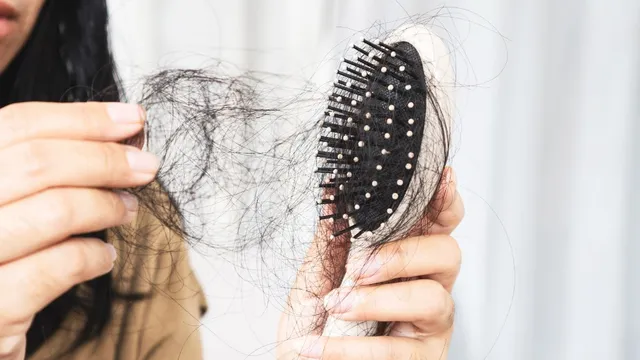- By Bornika Das
- Fri, 23 May 2025 10:34 PM (IST)
- Source:JND
Excessive hair fall can be distressing, especially when the usual issues like stress, poor diet or seasonal changes don’t seem to apply. If you’re noticing clumps of hair in your brush, on your pillow, or in the shower drain, it may be time to consider a deeper, often overlooked cause that is your thyroid health. The thyroid gland plays a vital role in regulating metabolism, and when it’s not functioning properly, whether it’s underactive (hypothyroidism) or overactive (hyperthyroidism), one of the first signs can be significant hair thinning or loss.
Thyroid imbalances can disrupt the natural hair growth cycle, pushing more strands into the shedding phase and preventing new growth from taking place. This kind of hair loss is typically diffuse, meaning it affects the entire scalp rather than appearing in patches. While many people focus on external treatments like oils and shampoos, identifying and treating an underlying thyroid disorder is essential for stopping hair loss at its source. In conversation with Jagran English, Dr. Jayanti Khura, Consultant Internal Medicine, Manipal Hospital, Bhubaneshwar, explains how thyroid issues can trigger excessive hair fall.
How Thyroid Affect Hair Fall?
Thyroid horm'one is very essential for the growth and maintenance of your hair. Dr. Jayanti Khura states, “It affects metabolism of your body and also the hair cycle. Both under active and over active thyroid issues can affect your hair.” Under active thyroid issue is called hypothyroidism and over active thyroid issue is called hyperthyroidism.
Thyroid conditions not only cause hair fall but also change the texture of hair. Hypothyroidism slows down the metabolic rate and hair cycle and can cause dry, coarse hair. Hyperthyroidism increases the metabolic rate and makes the hair cycle faster and can cause fine hair. Dr. Jayanti Khura mentions, “Both conditions can cause hair fall and hair breakage. The hair fall usually involves the whole scalp, leading to uniform thinning of hair, but can rarely cause patchy hair fall in a particular area only. This patchy area of hair loss is called alopecia areata and is usually due to autoimmune thyroid disease.”
Thyroid issue-induced hair fall does not just involve the scalp but can also involve eyebrows, eyelashes or pubic hair. “So there may be loss of one-third of eyebrow, thinning of eyelashes and pubic hair. So if you are wondering whether your hair fall is related to your thyroid, look for hair loss in other body parts also,” Dr. Jayanti Khura states.
-1748019716151.jpg)
Thyroid Triggers Excessive Hair Fall (Image Credits: Canva)
Other Symptoms Of Thyroid
The hair symptoms may have preceded or come after the onset of other symptoms of thyroid issue. The other symptoms of hypothyroidism are - weight gain, fatigue, lack of concentration, cold intolerance, dry hands, puffiness of face, hoarseness of voice, constipation, lack of appetite, menstrual abnormalities, etc.
The other symptoms of hyperthyroidism are - weight loss, increased appetite, diarrhoea, heat intolerance, palpitation, sweating, moist skin, etc.
The good news is that thyroid issue induced hair fall is temporary and it stops with treatment of the thyroid dysfunction. It takes some time for the hair fall to stop after starting the thyroid medication. So do not get disheartened. Continue the medications and you will gradually see results.

